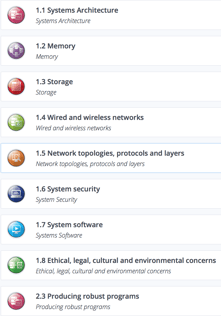 - Product Upgrade Announcement
- Product Upgrade Announcement
We're really excited here at Codio to be releasing our resources to support the teaching of OCR's new J276 Computer Science course. In comparison to J275, this course places a greater emphasis on mathematical skills, computational thinking, and problem solving. It also promises to be more relevant in today's society and be an enjoyable course for students. And it’s the perfect preparation for the OCR A-level computer science specification or even an OCR Science specification more broadly.
I've taken a quick look at the OCR Computer Science J276 specification to see what is in store for teachers and students and highlighted a few topic areas that stand out for me. Also, remember you can take a trial to see the content for yourself.
What is immediately obvious is that the structure of the course and the weightings have changed in this new OCR specification. There are now two written exams (instead of one), each worth 40% of the total mark. Controlled Assessment has been replaced with Non-Exam Assessment (NEA) and is now worth 20% of the total mark. This marks a big shift from the approach in J275 where students would spend a considerable amount of time working on their solutions for the Controlled Assessment tasks.
 Component 1 - Computer Systems
Component 1 - Computer Systems
Students will be expected to understand not only the role of the CPU but also that of supporting registers such as the Program Counter and the Memory Address Register. Systems Architecture has traditionally been part of the AS course but by moving the content to the GCSE level, students will gain a more rounded understanding of the Fetch-Decode-Execute cycle. Don't forget about our very own Little Man Computer called Crunch to help you teach this.
One topic that OCR has thoroughly developed is System Security. It's certainly a relevant topic considering recent high-profile cases. Students will learn about DDoS and Brute Force attacks as well as the concept of Social Engineering and terms such as Phishing and Malware. This is a great opportunity for students to do some investigations of their own and to share their findings with the class.
Component 2 - Computation Thinking, Algorithms, and Programming
I'm really pleased to see that OCR has introduced some key searching and sorting algorithms to the specification. This is content that has been taken from the AS Computer Science course but it is better suited to the GCSE level in my opinion. If possible, take the opportunity to get the students out of their chairs to teach this topic. For example, students could be sorted into height order by applying a particular algorithm.
There is an excellent new topic on producing robust programs which I feel will promote good practice. It includes a number of sections including validation, authentication, and error types.
There is an opportunity here for students to learn by doing. Given a scenario, they can develop small programs that focus on validating user input for example. In addition to getting more programming practice, students are also learning new techniques that they can later apply to their work for the NEA.
Overall, the J276 specification looks to be a big improvement over its predecessor and great preparation for the computer science OCR A-level specification. The new structure of the course will allow students more time to develop their programming skills before starting the NEA and the theory is more relevant, varied, and challenging.
I've always felt that GCSE Computer Science courses prepare students well for the OCR computer science specification A-level, or later life, and with the additions and improvements to J276 I'm certain that this course will do just that.
Live Webinar to Demo J276
If you are interested in a live webinar to view the J276 curriculum in Codio, you can either start a free trial or you can join me at a time that works for you.





